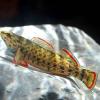Random fish death
#3
 Guest_EricaWieser_*
Guest_EricaWieser_*
Posted 02 December 2010 - 07:49 PM
The one thing I would like to add to my fish-keeping-paraphernalia but don't already have is a high powered microscope. A microscope could show you spores or bacteria that you would have no other way of knowing were there.
Edit: Oooh, 1200x magnification for $25 including shipping: http://www.cookieski...r:referralID=NA
Edited by EricaWieser, 02 December 2010 - 07:53 PM.
#5
 Guest_Skipjack_*
Guest_Skipjack_*
Posted 02 December 2010 - 09:41 PM
#7
 Guest_EricaWieser_*
Guest_EricaWieser_*
Posted 02 December 2010 - 11:46 PM
Unless you have the internet and this handy guide. http://www.fishdoc.c...ope/micro01.htm (click 'next' at the bottom)WRT microscopy, necropsy, etc.,...you have to know what to look for. Unless you have training in fish pathology it probably won't be instructive.
#8
 Guest_exasperatus2002_*
Guest_exasperatus2002_*
Posted 03 December 2010 - 10:00 AM
#9
 Guest_nativeplanter_*
Guest_nativeplanter_*
Posted 03 December 2010 - 10:04 AM
Have you considered doing a necropsy? It's easy to say offhand that you don't think there was anything wrong with the fish. It's quite another thing to cut it open and find out.
The one thing I would like to add to my fish-keeping-paraphernalia but don't already have is a high powered microscope. A microscope could show you spores or bacteria that you would have no other way of knowing were there.
Edit: Oooh, 1200x magnification for $25 including shipping: http://www.cookieski...r:referralID=NA
Umm... something isn't right here. A 100x oil imersion lens gives a total magnification of 1000x; these scopes aren't cheap. This is either false advertising, or an amazingly distorted lens (or, likely, for only $25, both).
Google oil immersion microscopy. This is what you would need to do microbiology.
That's an interesting guide, but I don't think many people would be able to start from scratch with no microscope experience and be able to successfully navigate to the end. Even making a tissue slide that is thin enough for compound microscopy can be difficult for beginners. Then, you need to have some experience with what different types of cells look like. A neat guide for getting someone who is very, very, interested going and whetting their appetite, but they will need to spend quite some time at it to feel at all successful. When I taught biology labs in graduate school, I might have given that guide to one of the very interested and bright students who wanted to spend time on their own and were interested in the subject. If starting with minimal microscope experience, most of the students likely would not have had the patience to keep at it until they got any results. It's not impossible, and certainly do-able if you want to spend some time at it, but it's not as easy as it sounds. Not something that would yield results on a Saturday afternoon.Unless you have the internet and this handy guide. http://www.fishdoc.c...ope/micro01.htm (click 'next' at the bottom)
#11

Posted 03 December 2010 - 03:33 PM
But seriously, if your dollar or (unlikely) betta roughed it up, you would most certainly see some sort of physical damage. Tattered fins, missing scales. Even if it was geriatric, you should have seen it coming. 'Old' fish still deteriorate by means of not feeding as well, not swimming/acting quite right, have subtle (usually paler) color changes. But then again, sometimes the do just die...
How long did you have it/how large was it when you got it?
#12
 Guest_Irate Mormon_*
Guest_Irate Mormon_*
Posted 03 December 2010 - 10:50 PM
Sometimes they just die.... I've had plenty fish just die.
Well, it's time I told you guys what really happened - this idle speculation has continued for long enough.
The fish died because I pronounced its death. Not publicly, mind you, but I made a little post-it note that said the fish was going to die, and stuck it to a corner of my monitor. You guys scoff at me when I make these pronouncements, but as the poll indicated, the majority of NANFAn's believe I am right EVERY TIME!
#13
 Guest_FirstChAoS_*
Guest_FirstChAoS_*
Posted 04 December 2010 - 05:12 AM
my rainbow shiner died, no diseases no parisites, my only thought are filter or betta/ dollar sunfish.
The dollar is possible, I had my dollar kill fish before. He was the tyrant of my tank even attacking fish larger than himself until I got the giant bluegill. The bluegill turned him docile.
#15
 Guest_az9_*
Guest_az9_*
Posted 10 December 2010 - 07:54 AM
Umm... something isn't right here. A 100x oil imersion lens gives a total magnification of 1000x; these scopes aren't cheap. This is either false advertising, or an amazingly distorted lens (or, likely, for only $25, both).
It says what's wrong with it. It's made in Freaking China!
#16
 Guest_az9_*
Guest_az9_*
Posted 10 December 2010 - 07:58 AM
But seriously, if your dollar or (unlikely) betta roughed it up, you would most certainly see some sort of physical damage. Tattered fins, missing scales.
Maybe the dollar stressed it enough for it to succumb to a facultative pathogen? I beleive aeromonid bacteria are always present and don't need to show outward clinical signs to kill a fish.
Not stressed enough by the dollar for physical damage. Kind of like mental stress vs. physical.
Edited by az9, 10 December 2010 - 08:01 AM.
Reply to this topic
1 user(s) are reading this topic
0 members, 1 guests, 0 anonymous users








